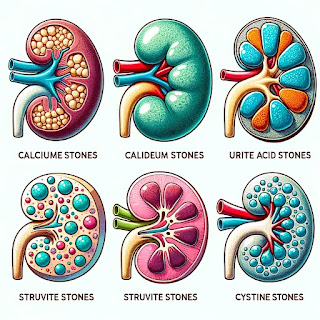Understanding Kidney Stones
Causes, Symptoms, and Prevention
Kidney stones are a common health issue that can cause significant discomfort and pain. This blog aims to provide a comprehensive understanding of kidney stones, including their types, causes, symptoms, and effective prevention strategies.
What are Kidney Stones?
Kidney stones are hard deposits made of minerals and salts that form inside your kidneys. While they can affect any part of your urinary tract, they're most commonly found in the kidneys themselves. The composition of kidney stones can vary, leading to different types.
Types of Kidney Stones
As shown in the image, there are several types of kidney stones:
- Calcium Stones: Usually in the form of calcium oxalate, these are the most common type.
- Uric Acid Stones: Often formed in people who don't drink enough fluids or who eat a high-protein diet.
- Struvite Stones: Typically form in response to an infection, such as a urinary tract infection.
- Cystine Stones: These are rare and form in people with a genetic disorder that causes the kidneys to excrete too much of certain amino acids.
Causes of Kidney Stones
Kidney stones can have several different causes, often depending on their type. Common causes include:
- Dehydration: Not drinking enough water each day can increase your risk.
- Dietary factors: A diet high in protein, sodium (salt), and sugar can promote certain types of kidney stones.
- Obesity: Higher body weight is linked to kidney stone formation.
- Medical conditions: Some conditions, such as renal tubular acidosis, and certain medications can increase your risk.
Symptoms of Kidney Stones
The symptoms of kidney stones can vary but typically include:
- Severe pain: Often felt in the side and back, below the ribs.
- Pain during urination: A sharp pain when you urinate.
- Other symptoms: These can include pink, red, or brown urine, a persistent need to urinate, nausea, vomiting, and fever.
Prevention of Kidney Stones
Preventing kidney stones involves lifestyle and dietary changes:
- Stay Hydrated: Drink plenty of fluids, especially water.
- Eat a Balanced Diet: Limit foods high in oxalates (like spinach) and reduce salt and animal protein intake.
- Maintain a Healthy Weight: Being overweight can increase the risk.
- Monitor for Recurrent Stones: If you've had kidney stones before, your doctor may recommend specific strategies based on the stone's type.
Conclusion
Understanding the types, causes, and symptoms of kidney stones is crucial for prevention and management. By staying hydrated, eating a balanced diet, and maintaining a healthy weight, you can significantly reduce your risk of developing kidney stones. If you experience symptoms of kidney stones, it's important to seek medical advice for appropriate treatment and to prevent future occurrences.



0 Comments